Roboskî Massacre and Snowden: A new year for Kurdish activists
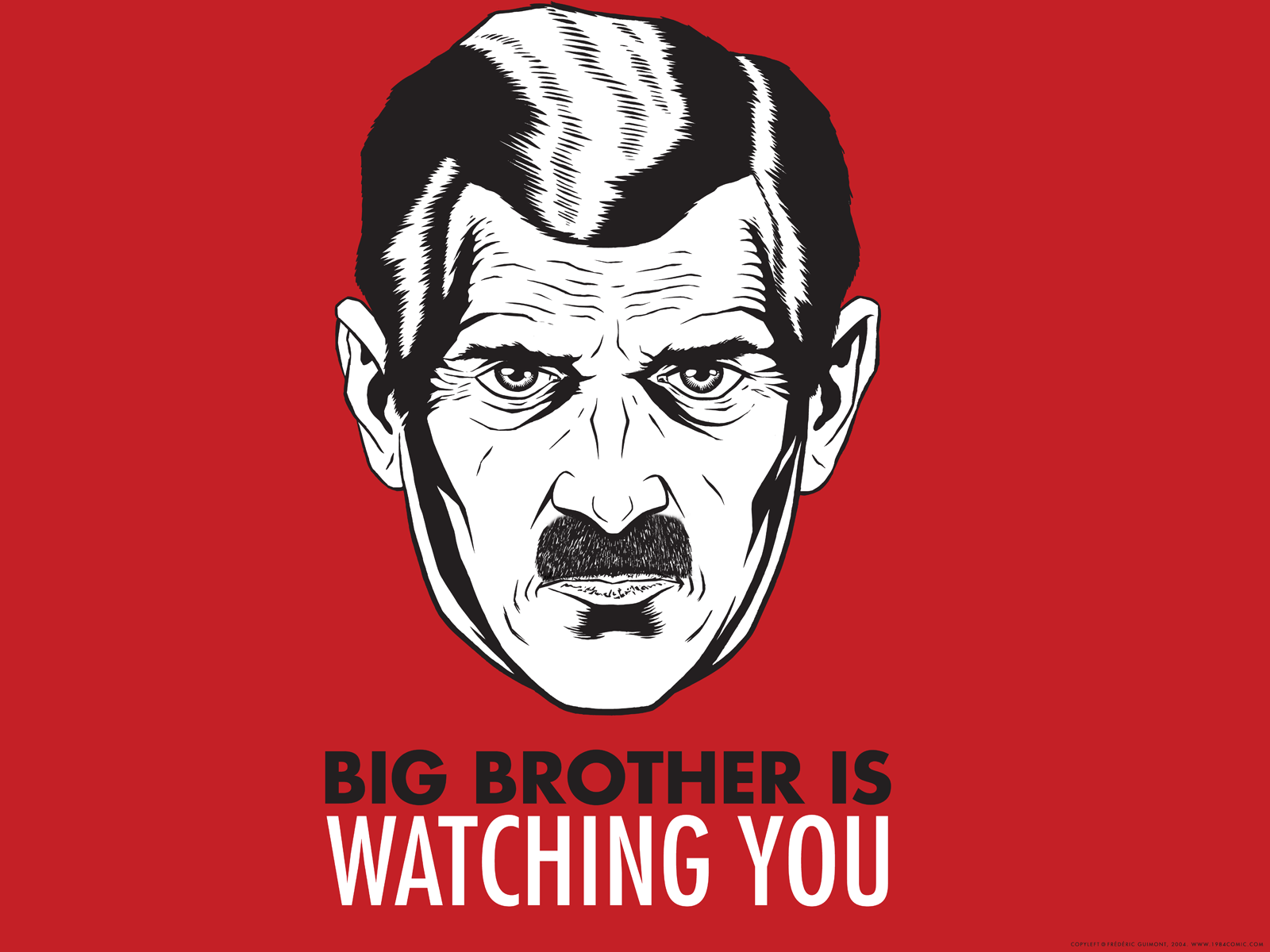
Three years ago, a U.S. Predator drone spotted movement on Turkey’s border with Iraq. As part of a close collaboration between the U.S. and Turkey with the task of closely monitoring the Kurdish armed fighters of PKK (Kurdistan Worker’s Party), the U.S. intelligence officials notified their Turkish colleagues about their findings but allegedly also informed them that they were not able to determine the identities of the dark frames on the footage.
A meeting between senior leaders of the Turkish Armed Forces about the U.S.-sponsored intelligence concluded with the approval of a raid against the unidentified group at the border. For 47 minutes that night in December, Turkish F-16 planes were bombing the group that turned out to be 34 civilian Kurds, smuggling goods across the border in order to support their families.
29 were from the same family. 21 of them were teenagers. 5 of them were younger than 15 years old.
It was a massacre that prompted Kurds to immediately rally against the Turkish government. While Turkish media kept silent or echoed the Turkish government’s words about the massacre being “an operational mistake”, Kurds were sharing every bit of information they could gather on social media. For three years now, journalists, lawyers, politicians and activists in Turkey and beyond have pushed for the relevant authorities to be taken to court and receive due penalty but to no avail.
On January 7 this year news came that the Roboskî case had been dismissed:
The General Staff’s Military Prosecutor’s Office has dismissed the investigation into the Uludere/Roboski massacre, in which 34 civilians were killed in an air strike, saying in its ruling military officers have made an “inevitable” mistake while performing their duty.
It is worth emphasizing that it was the General Staff itself who approved and ordered the fatal blitz. It underlines the lack of a fair, just and transparent system which is typical in cases that revolve around the Turkish state’s abuse of power and ongoing violations of human rights.
The Roboskî massacre brought to light the perilousness attached to the collaboration between the U.S. and Turkish intelligence agencies. Adding to that the waves set in motion by U.S. whistleblower Edward Snowden’s leaked documents, it is time to reconsider how vulnerable online Kurdish activists are to targeted surveillance in Turkey.
Recently, new legislation was proposed that would allow for authorities to monitor internet users and block website content without a court’s permission but it was rejected by the constitutional court. Now, the “decision-making authority” in the new proposed bill has been changed to “the related minister and ministry”, basically just a change of names that will allow for the bill to be approved by the court. I spoke to RedHack, a Turkey-based hacker group, who in opposition to the Turkish government hacks websites belonging to government institutions and military forces in an attempt to expose state corruption. Turkish authorities labeled RedHack “an armed terrorist organisation”. In our conversation, RedHack spoke about the consequences of the new proposed internet laws:
“This is a step towards controlling the minds of the people and a blow to the so-called “democracy” whereas as a whole it targets freedom of speech and this leads to more dictatorial powers over the will of the people. The government is more concerned about their dirty work to be exposed by the opposition and hackers. They now have all the powers and are stronger in all the governmental institutions from military to justice system and hold a majority in the parliament. So everything suits their needs. Turkey is literally governed by a dictatorship now.”
“We would not be surprised by any laws they will implement. But surely this has positive side too. More oppression means more resistance and more people will be involved in raising their voices against injustices once they realize this dictatorial system affects their day to day life and consciousness.”
I asked them if they thought the Turkish state is using surveillance to target activists in Turkey:
“Clearly yes. Because they will try to silence those who are already opposing their governance. Because activists are getting stronger at organizing people to resist against this corrupt gang of thieves. They are the ones that need to be targeted first. We need to find the ways to unite people regardless of their race, colour, religion, gender or political views. If we cannot succeed in this then it might be too late for the future generations to live in peace.”
I have not been unaware of efforts to protect the privacy of internet users but the large online and offline community that exists to secure and promote their rights was merely something happening in the far periphery and did not seem vital to consider using when working with Kurdish rights. It was not until I befriended one of the world’s most private civil rights activist whose work is all based online, attended a conference where a knowledgeable security researcher and hacker was speaking about drones and illegal spying and saw the Edward Snowden case unfold into what seemed more and more like a nightmare that I became interested in what surveillance be it via the internet or drones mean for Kurdish activists.
In August, the journalists in possession of the NSA documents leaked by Edward Snowden wrote the first (and so far only) piece that involves Kurdish activists called “How the NSA helped Turkey kill Kurdish rebels”
According to The Intercept article, the U.S. intelligence provided Turkish intelligence with information about the location of PKK leaders by determining the position of their mobile phones and the location of PKK members outside Turkey. The article also mentions that the internet communications of PKK leaders in Europe was infiltrated which was made possible by the Turkish intelligence who contributed with the leaders’ mail addresses.
The Intercept article quotes one document leaked by Snowden:
“Geolocations data and voice cuts from Kurdistan Worker’s Party (PKK) communications which were passed to Turkey by NSA yielded actionable intelligence that led to the demise or capture of dozens of PKK members in the past year.”
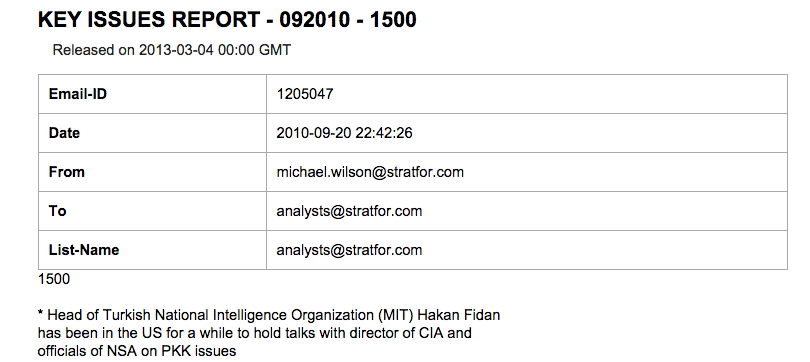
Leaked documents on Wikileaks is an attestation of the regular cooperation between Turkish and U.S. intelligence in the fight against PKK.
The Intercept article furthermore links to an information paper about the collaboration between the U.S. and Turkish intelligence and giving NSA access to “military targets of interest” including PKK and the Revolutionary People’s Liberation Party/Front (DHKP/C).
The collaboration was in May 2007 expanded to allow for “actionable intelligence” which means information that can be acted upon against the PKK who in the information paper is referred to as KGK, Kurdistan People’s Congress. The paper lists tools that NSA provides Turkish partners with in order for the latter to uphold requirements regarding intelligence gathering on the before-mentioned military targets.
In return, Turkey provides NSA with real time reporting on PKK and “Turkish transcripts of KGK voice collection.”
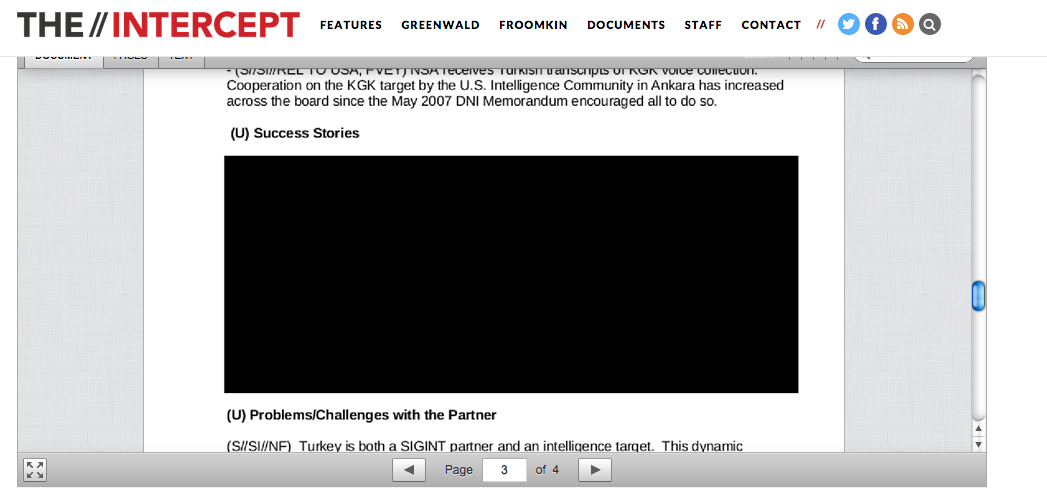
The NSA’s paragraph on their “success story” has been blotted out
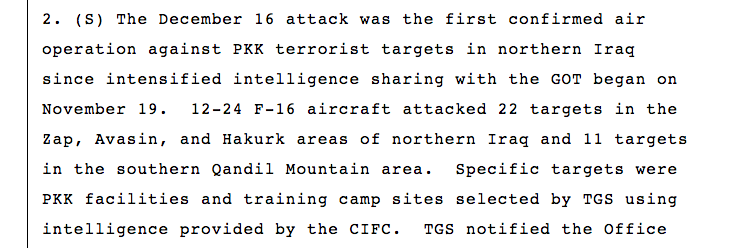
An excerpt from Wikileaks that exemplifies the use of shared intelligence between the U.S. and Turkey. CIFC = Combined Intelligence Fusion Committee composed of the U.S. and Turkey.
As these examples show in detail and as is by now common knowledge, the U.S. and Turkey work closely in collecting and sharing information that can bring about actions to target Kurdish subjects. With Roboskî we learned that the intelligence gathering does not discriminate between civilians and armed fighters, at least on Turkish side.
It is still unknown to the wide public how deep the Turkish-U.S. intelligence collaboration goes and how it affects Kurdish activists but The Intercept article mentions an example of how activists are exploited in the fight against PKK, and it is chilling:
In January 2012, U.S. officials proposed supporting Turkey in their fight against the PKK with diverse measures, including access to a state-of-the-art speech recognition system that enabled real-time analysis of intercepted conversations. The system can even search for keywords and identify the person speaking if a voice sample of that individual has been stored.
The NSA offered to install two such systems for Turkey’s intelligence service. In exchange, the Turks would provide voice samples for a number of Kurdish activists.
The article does not mention from where these voice samples have been acquired; if it is from intercepted communications or something like recorded police interviews from former detainments. Regardless, even the slightest suspicion that such conduct is taking place should prompt Kurdish activists to consider securing themselves better against illegal spying and exploitation.
The NSA’s abusive information gathering and its delivery to Turkish counterparts has had detrimental consequences for members of the PKK. We can only guess if the Kurds targeted were indeed PKK members. Ongoing violence against Kurdish protesters, harassment of politicians, students and activists and the slow, almost non-existent improvement of civil rights is a daily lesson in the Turkish government’s attitude against the Kurdish community: that the government and its operating arms in civil society do not discriminate between an armed PKK member or a Kurdish boy with a rock. This mind-set is perpetuated by the language in media that uses “PKK protests” and “Kurdish protests” interchangeably.
There is not one specific way to protect yourself against interception and surveillance but there are several ways to secure oneself as much as possible. The links shown below by the Electronic Frontier Foundation (EFF) are a good way to start for those of us who are still new to the pitfalls of the internet.
Surveillance Self-Defense: Activist or Protester
Surveillance Self-Defense: Human Rights Defender
There is no better way to end this post than quoting George Orwell, the author of 1984:
Big Brother is watching you
The Alliance for Kurdish Rights aims to amplify diverse Kurdish voices. Views expressed by our authors and contributors are not necessarily our own. We welcome constructive and respectful feedback and discussions. If you’d like to contribute to AKR, join us.
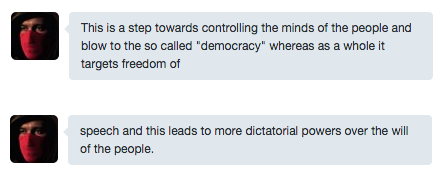
Comments are closed.